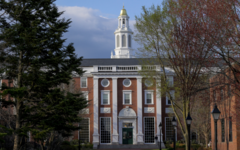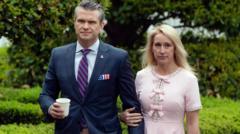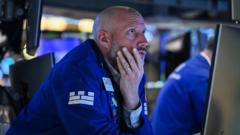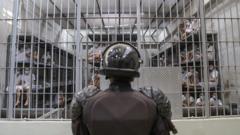In his first week back in office, Trump demonstrates a decisive approach, reshaping policies and asserting control over Washington, while learning from previous missteps.
Trump 2.0: A Bold Return to Power and Reform
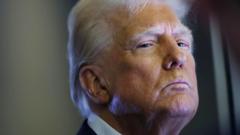
Trump 2.0: A Bold Return to Power and Reform
Trump resumes presidency with confidence and rapid executive action, signaling a new political era.
On Saturday night, as President Donald Trump journeyed from Las Vegas to Miami, he took the opportunity to engage with reporters aboard Air Force One, marking a triumphant start to his new term. The plane was tuned into Fox News, reflecting Trump's confident demeanor after a week that fundamentally altered U.S. governance and immigration policies. "We're getting A-pluses on the work done - and also the amount of work done," he declared, insisting that his initial days in office were among the most successful any president could claim.
During an impromptu discussion, Trump addressed a range of topics, including a late-night dismissal of multiple independent government watchdogs. He expressed optimism about acquiring Greenland, urged neighboring countries like Egypt and Jordan to accept more Palestinians, and discussed his "very good relationship" with UK Prime Minister Sir Keir Starmer, highlighting a marked contrast with his predecessor, Joe Biden, who rarely held such informal engagements.
Symbolically, the Oval Office has reverted to familiar trappings of Trump's first term, with the reinstatement of the iconic Diet Coke button and the bust of Winston Churchill. However, these aesthetic changes go hand in hand with robust executive actions reshaping U.S. policy within mere days of Trump's return. From undoing major policies to issuing a vast array of executive orders, his actions have rapidly dismantled key aspects of the former administration’s legacy.
Central to Trump's bold reassertion of power was a series of pardons for over 1,500 supporters convicted in connection with the 2021 Capitol riot, effectively rewriting the narrative that had once isolated him politically. Not stopping there, he has taken steps to rename the Gulf of Mexico to the Gulf of America, solidified a stance on recognizing only two sexes, and removed the U.S. from the Paris Climate Accord, calling into question America's role in global diplomacy and climate initiatives.
In juxtaposition to his previous term, Trump's administration appears far more organized and driven by loyalists who are unlikely to turn against him. The dynamic political backdrop—one with a Republican majority in Congress—bolsters his confidence as he pushes forward where he left off, this time with a clearer strategy aimed at reversing any previous setbacks.
Reflecting on the administration's current approach, political historian Douglas Brinkley suggests that Trump's actions symbolize not just confidence but a desire to cement his legacy as a transformative President. Under his new term, Trump seeks to hold the previous administration accountable while rapidly charting a course for his own agenda—all indicative of his belief that he stands unfettered by traditional political norms.
While Trump's ability to act quickly garnered praise from allies, critics remain wary. The administration is determined to build on lessons learned from the earlier struggles with judicial challenges. With a belief that the judiciary is now more favorable, Trump and his team are gearing up to ensure their initiatives endure.
Regardless of how his policies unfold in the legal landscape, Trump's inclination to "move fast and break things" is clear. His return signals to supporters and opponents alike: the game is changing in Washington, and Trump is ready to play for keeps once more.
During an impromptu discussion, Trump addressed a range of topics, including a late-night dismissal of multiple independent government watchdogs. He expressed optimism about acquiring Greenland, urged neighboring countries like Egypt and Jordan to accept more Palestinians, and discussed his "very good relationship" with UK Prime Minister Sir Keir Starmer, highlighting a marked contrast with his predecessor, Joe Biden, who rarely held such informal engagements.
Symbolically, the Oval Office has reverted to familiar trappings of Trump's first term, with the reinstatement of the iconic Diet Coke button and the bust of Winston Churchill. However, these aesthetic changes go hand in hand with robust executive actions reshaping U.S. policy within mere days of Trump's return. From undoing major policies to issuing a vast array of executive orders, his actions have rapidly dismantled key aspects of the former administration’s legacy.
Central to Trump's bold reassertion of power was a series of pardons for over 1,500 supporters convicted in connection with the 2021 Capitol riot, effectively rewriting the narrative that had once isolated him politically. Not stopping there, he has taken steps to rename the Gulf of Mexico to the Gulf of America, solidified a stance on recognizing only two sexes, and removed the U.S. from the Paris Climate Accord, calling into question America's role in global diplomacy and climate initiatives.
In juxtaposition to his previous term, Trump's administration appears far more organized and driven by loyalists who are unlikely to turn against him. The dynamic political backdrop—one with a Republican majority in Congress—bolsters his confidence as he pushes forward where he left off, this time with a clearer strategy aimed at reversing any previous setbacks.
Reflecting on the administration's current approach, political historian Douglas Brinkley suggests that Trump's actions symbolize not just confidence but a desire to cement his legacy as a transformative President. Under his new term, Trump seeks to hold the previous administration accountable while rapidly charting a course for his own agenda—all indicative of his belief that he stands unfettered by traditional political norms.
While Trump's ability to act quickly garnered praise from allies, critics remain wary. The administration is determined to build on lessons learned from the earlier struggles with judicial challenges. With a belief that the judiciary is now more favorable, Trump and his team are gearing up to ensure their initiatives endure.
Regardless of how his policies unfold in the legal landscape, Trump's inclination to "move fast and break things" is clear. His return signals to supporters and opponents alike: the game is changing in Washington, and Trump is ready to play for keeps once more.


